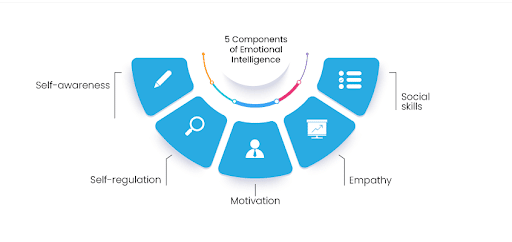Introduction
Human emotions are very complex, and a deep understanding of these emotions can play a significant role in different aspects of our life. Emotional intelligence is recognising, experiencing, reasoning, and managing emotions. This article delves deeper into the critical role of emotional intelligence at work.
What is emotional intelligence?
Emotional intelligence is popularly known as an emotional quotient (E.Q.). Psychologists John D. Mayer and Peter Salovey coined this term in 1990. Emotional intelligence (E.I.) is recognizing and understanding human emotions, and it also extends to using this understanding in daily problem-solving, decision-making, and communication.
5 Components of Emotional Intelligence
According to renowned psychologist Daniel Goleman, there are five components of emotional intelligence:

-
Self-awareness
It is the ability to recognize our emotions and emotional triggers and helps us understand how people perceive us.
-
Self-regulation
It is the ability to control and manage our emotions positively. It enables us to take a step back and understand our feelings better.
-
Motivation
Self-regulation and self-awareness allow us to motivate ourselves and others to expect and achieve positive outcomes.
-
Empathy
It is the capability to understand another individual’s emotions. It allows us to understand, communicate, and handle situations delicately and effectively.
-
Social skills
These tools allow us respectfully understand and communicate our thoughts and emotions.
What is emotional intelligence at work?
Psychologist Daniel Goldman, author of the book Emotional Intelligence: Why It Can Matter More Than IQ, popularised the concept of emotional intelligence. He puts forward the argument that emotional intelligence is crucial for career success. This concept quickly caught the interest of business leaders and human resources managers across the globe.
Today, emotional intelligence influences how employees interact with one another and influences work performance and how employees manage their job stress effectively. While traditional views held that intelligence was essential for career growth, emotional intelligence is now considered an integral component of career progression.
Emotional intelligence is a skill not only for upper management and leaders. It is a required and valued skill in employees at all levels, whether an intern or a C.E.O. emotional intelligence is critical to your success in the workplace today.
What is the importance of emotional intelligence at work?
Today, emotional intelligence is a skill that recruiters and companies look for while hiring employees. Experts opine that individuals with high dynamic intelligence display better communication and decision-making skills. They can work under pressure calmly and resolve conflicts effectively. Their deep understanding of human emotions allows them to receive constructive feedback, reflect, and improve themselves exponentially at work.
Individuals with low emotional intelligence prevent taking responsibility for their mistakes, communicate in a passive-aggressive manner, and quickly dismiss other people’s opinions. Studies show a high correlation between people with high emotional intelligence and job performance and career success [2], [3]. Emotional intelligence also helps forge positive relationships with coworkers, improve productivity at work, and create a positive outlook in life. While emotional intelligence comes naturally to certain people, researchers believe it is a skill individuals can develop with understanding, training, and time.
The benefits of emotional intelligence in work
Emotional intelligence is an important skill. It also comes with a host of benefits. These include:
- Positive and meaningful interactions with coworkers, management, and business leaders
- Create and deepen positive and meaningful relationships with every individual in the office. It allows one to grow and expand their network.
- A deep understanding of one’s own and others’ emotions will push them to motivate the team to visualize, anticipate, and achieve positive work outcomes.
- High emotional intelligence will open several career and job opportunities at the workplace.
- Allows to manage and effectively cope with stress and failures at work.
- It increases self-confidence and self-esteem.
- Improves communication and social skills
- Creates a creative, thriving, and positive environment.
- It gives us the strength and skill to deal with change and adversity.
- Improves teamwork, leadership, and customer interactions
- It allows one to recognize one’s limitations and work towards them in an organized and positive manner.
How do you develop emotional intelligence at work?
Emotional intelligence is a skill we can nurture and develop over time, and these are the simple tips we can follow to develop emotional intelligence.
-
Become self-aware
We must pause and pay attention to our emotions. Simultaneously, we must understand how we respond to these emotions. We must also take stock of our strengths and weaknesses and develop ways to deal with our feelings positively and effectively. There are some tips to build your skills to achieve your goal.
-
Practice self-regulation
We must engage in hobbies to manage our stress. We must also learn to control how we respond to different situations.
-
Become more empathetic
We must start understanding other people’s perspectives by putting ourselves in their shoes. We must listen to others and acknowledge their efforts and emotions.
-
Improve social skills
Listening to people and asking questions is the best way to enhance social skills. Also, we must learn the different forms of handling conflict and reducing tension.
-
Self-motivation
We must pay attention to what we love about our work and develop a positive attitude. At the same time, we must motivate our team members and push them to expect positive outcomes.
Wrap up!
Emotional intelligence is the ability to recognize and understand human emotions. Individuals with high emotional intelligence have a positive attitude, can motivate others, and manage stress effectively. Their ability to take constructive criticism and reflect on it allows them to grow and foster in the workplace. Today, emotional intelligence is a skill valued across all levels of employment.
While emotional intelligence comes naturally to some people, others can help foster it with time and training. We must practise self-awareness and learn to regulate our emotions to manage our stress effectively. Engage in hobbies outside work. Focus on the good things about work and have a positive outlook. It can open up career opportunities.
You can seek professional advice if you want to learn how to practise emotional intelligence at work and set yourself up for success in work and life.
| [1] | K. Cherry, “Utilizing emotional intelligence in the workplace,” Verywell Mind, 10-May-2018. [Online]. Available: https://www.verywellmind.com/utilizing-emotional-intelligence-in-the-workplace-4164713. [Accessed: 03-Jan-2023]. |
| [2] | I. Urquijo, N. Extreme, and G. Azanza, “The contribution of emotional intelligence to career success: Beyond personality traits,” Int. J. Environ. Res. Public Health, vol. 16, no. 23, p. 4809, 2019. |
| [3] | P. N. Lopes, D. Grewal, J. Kadis, M. Gall, and P. Salovey, “Evidence that emotional intelligence is related to job performance and affect and attitudes at work,” Psicothema, vol. 18 Suppl, pp. 132–138, 2006. |











